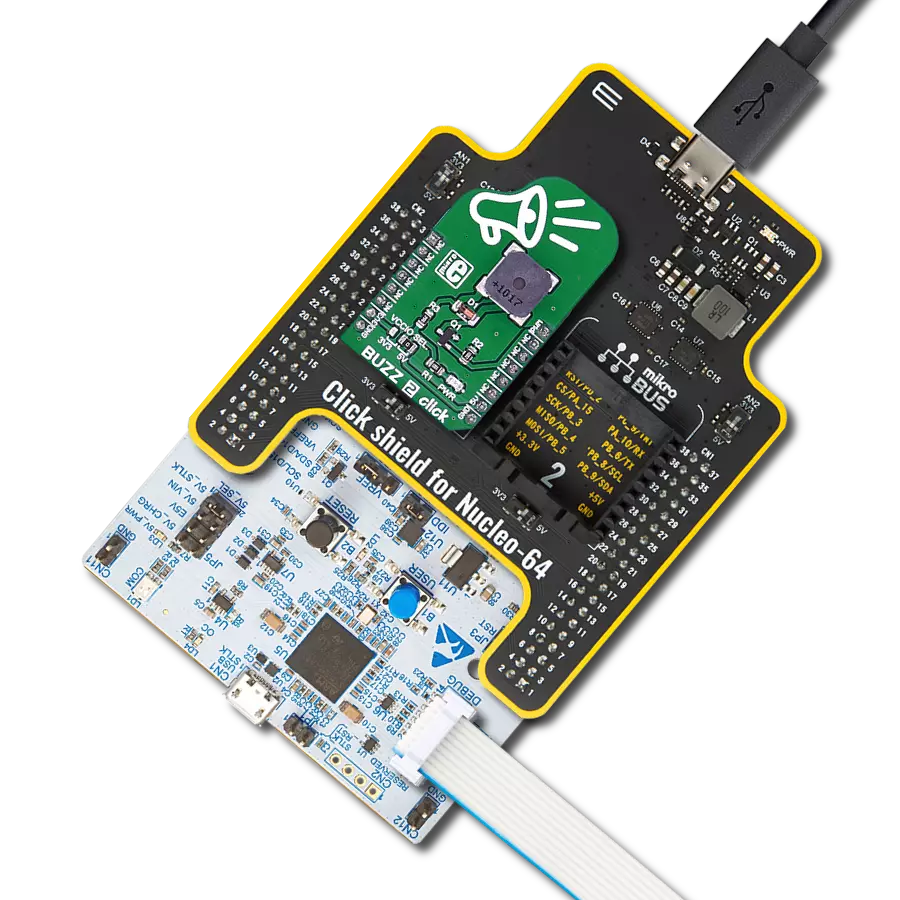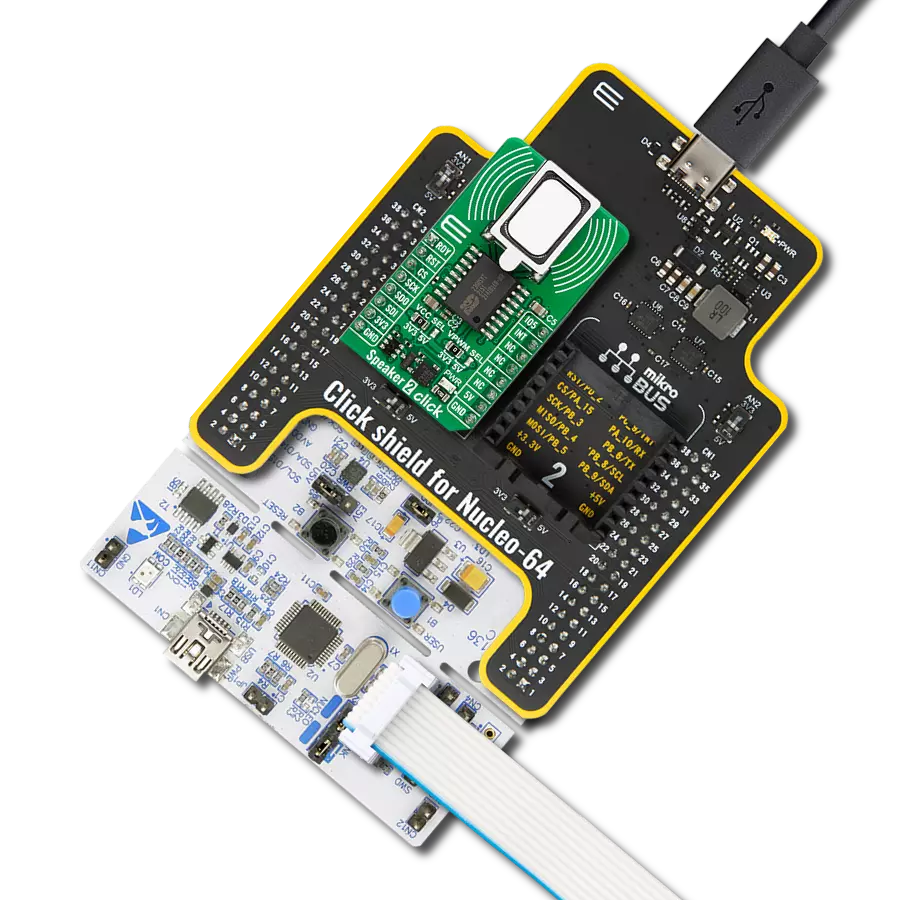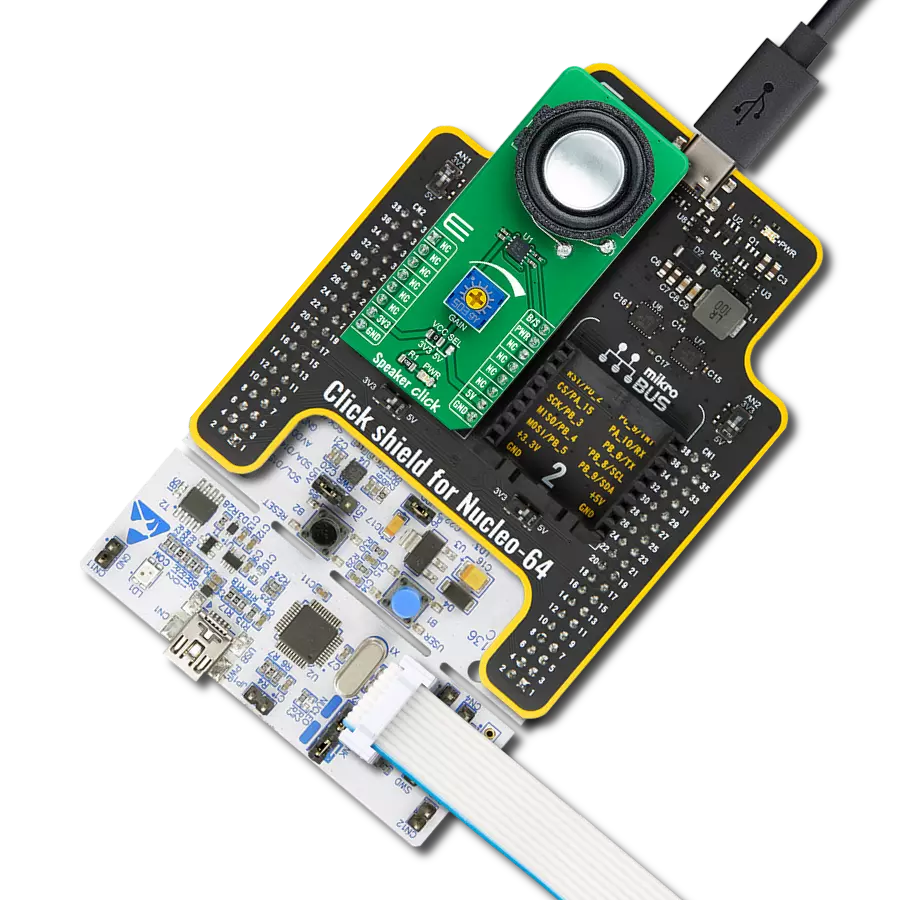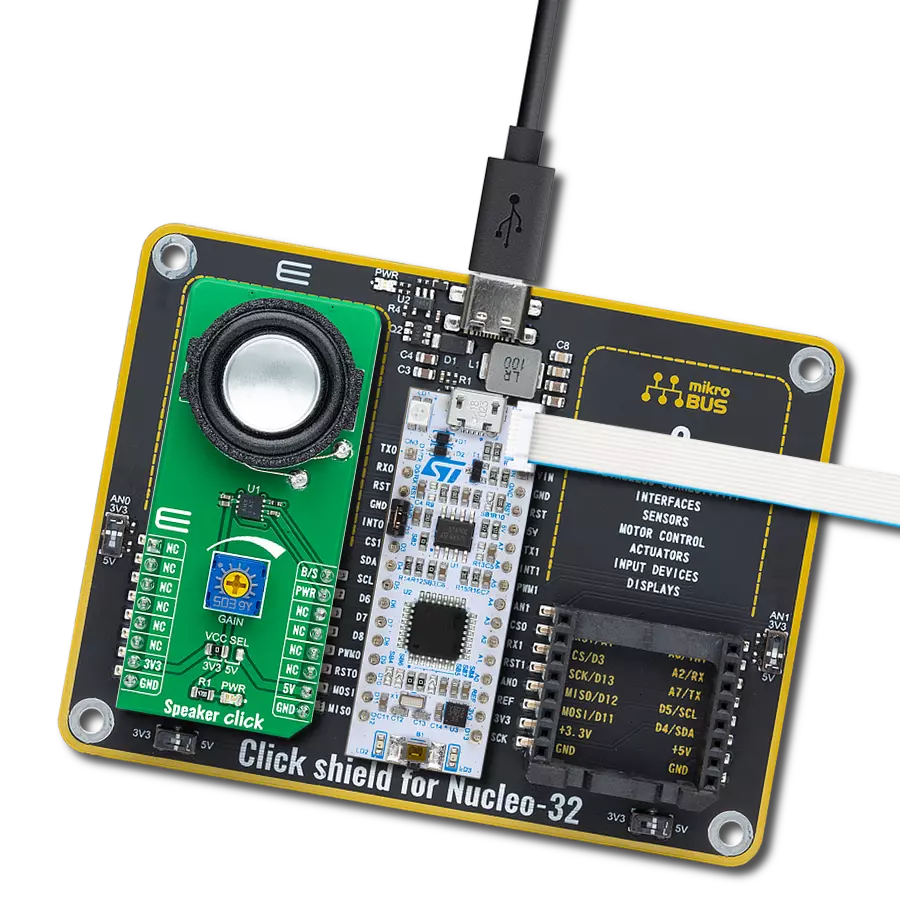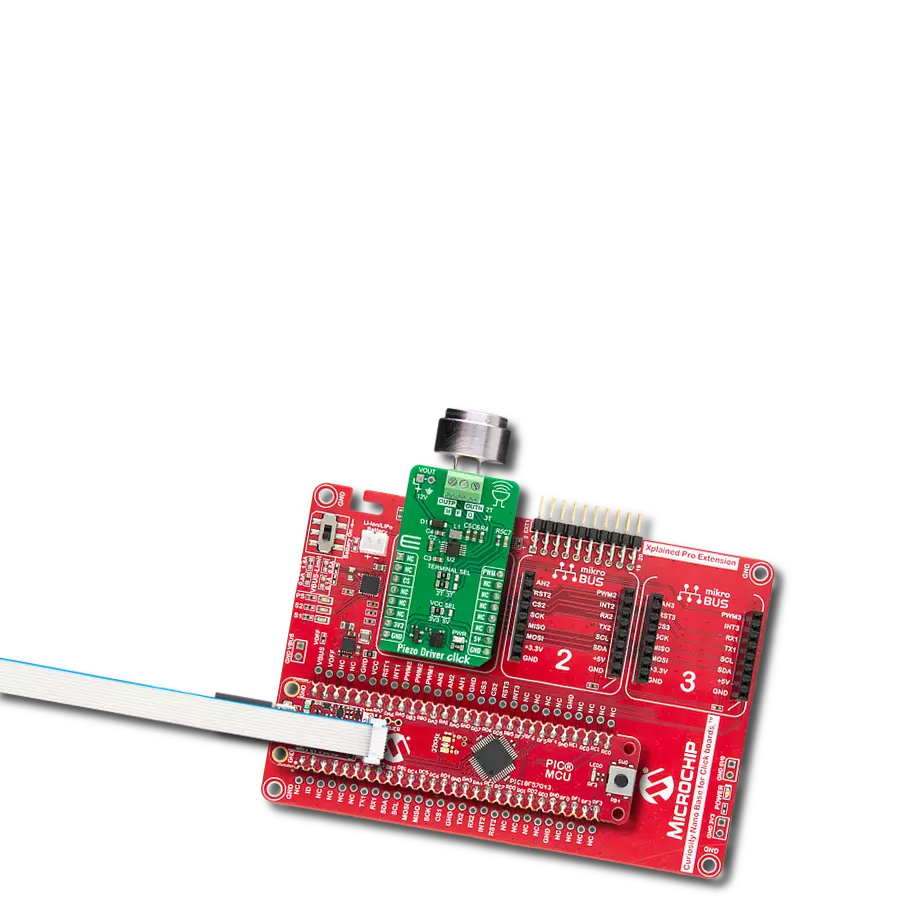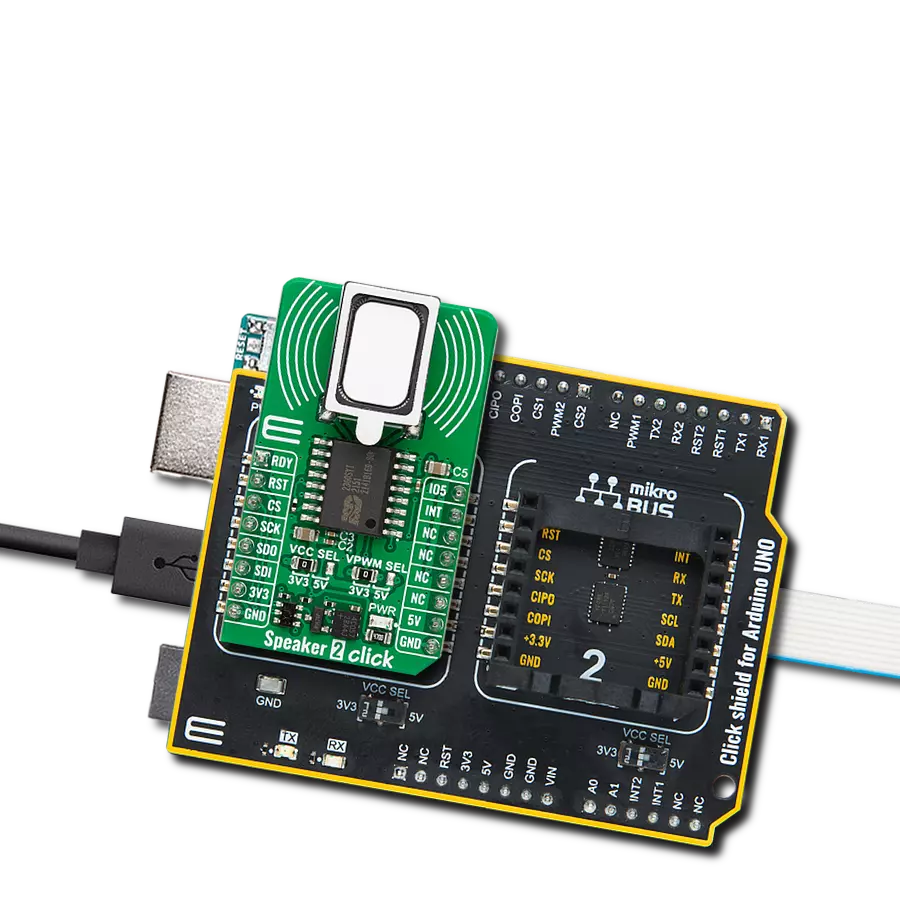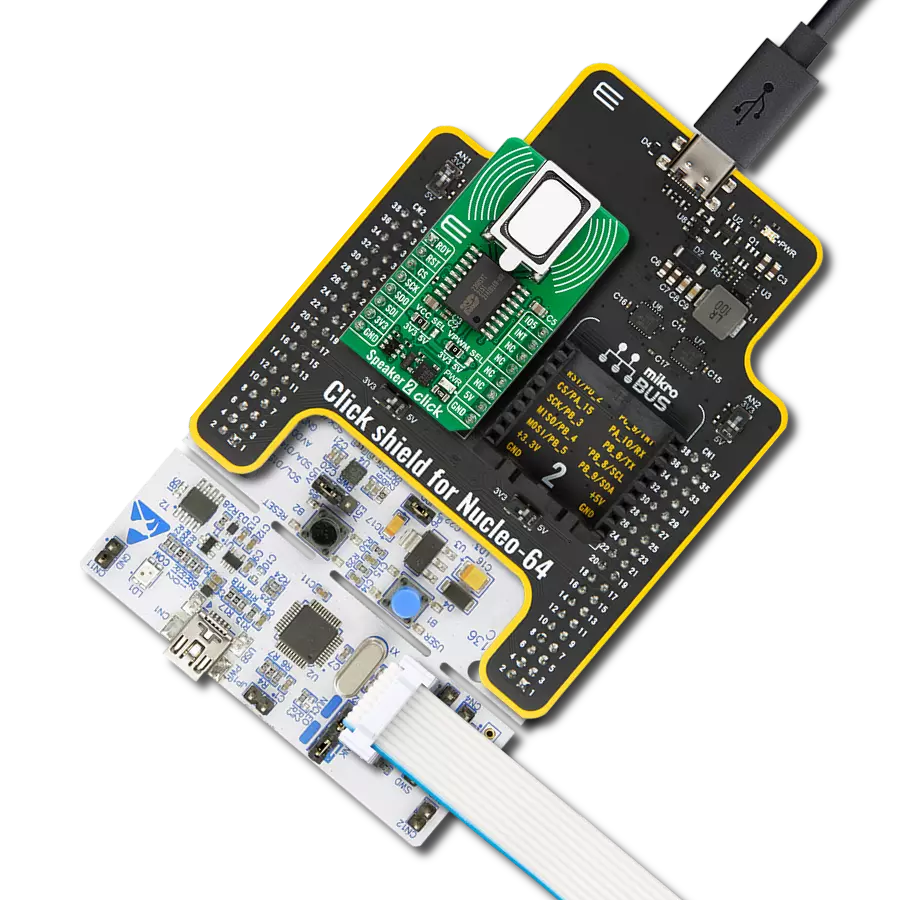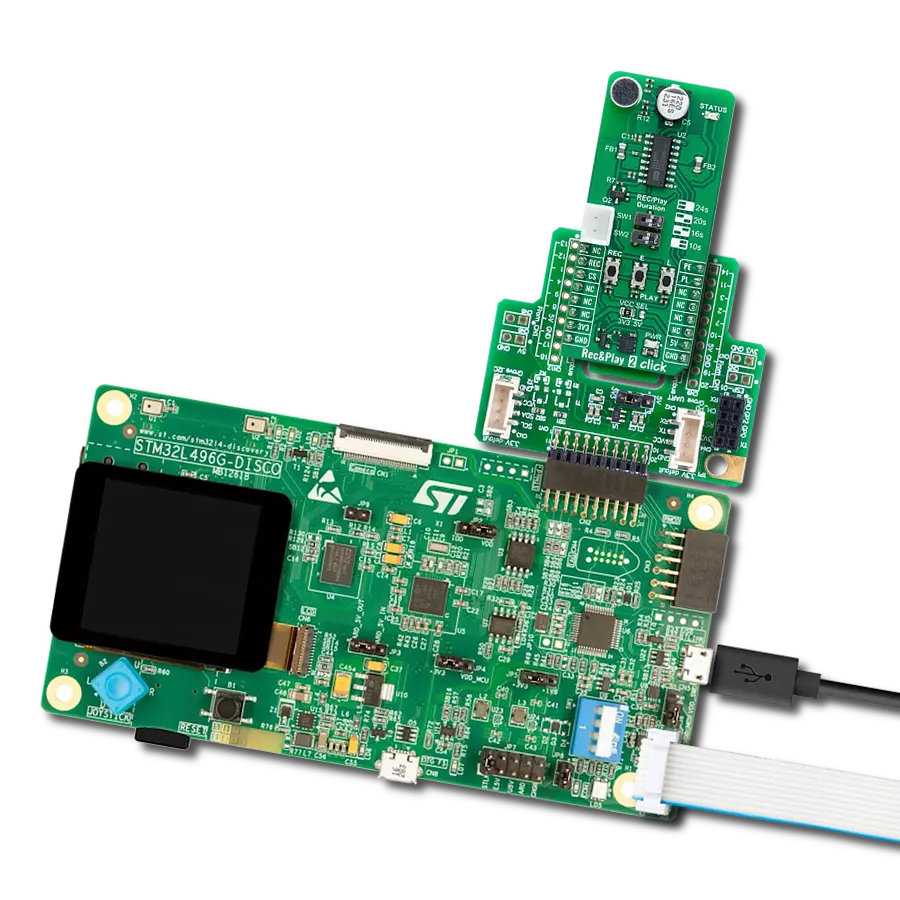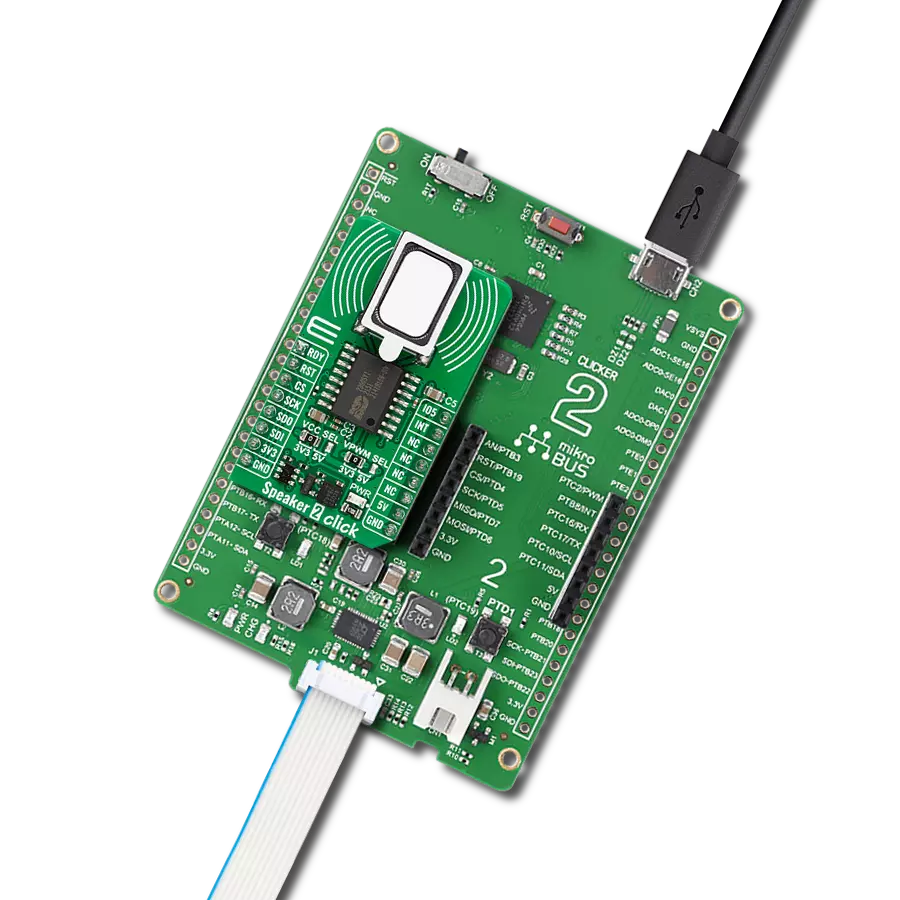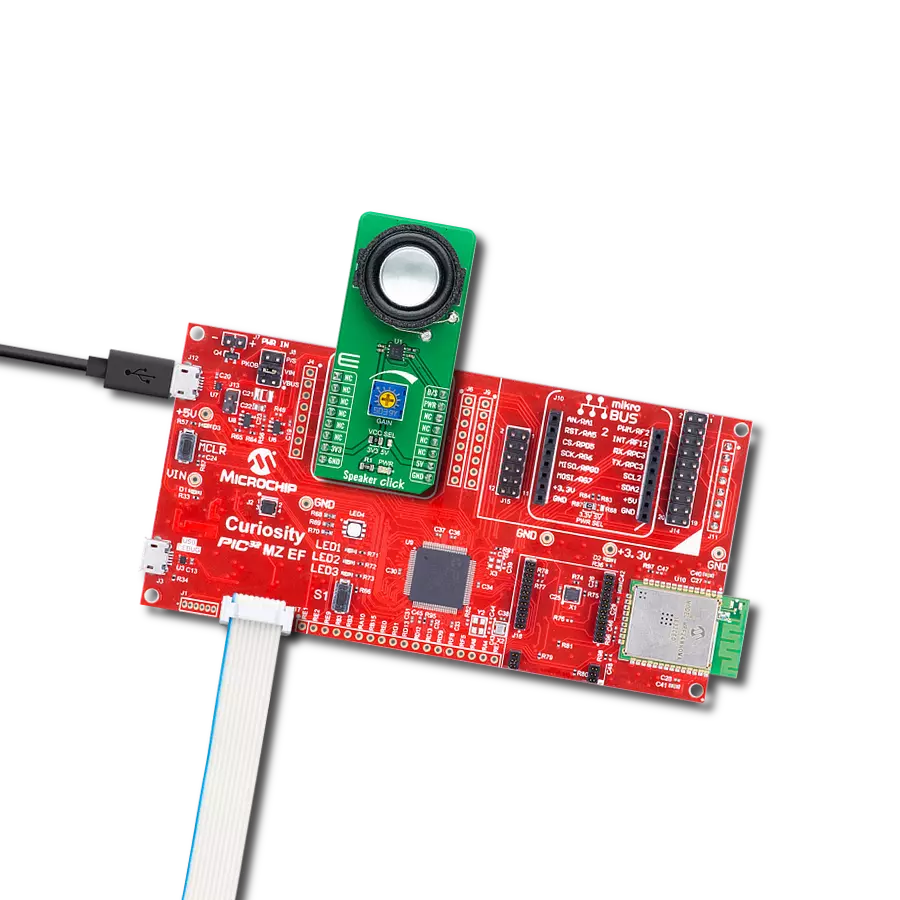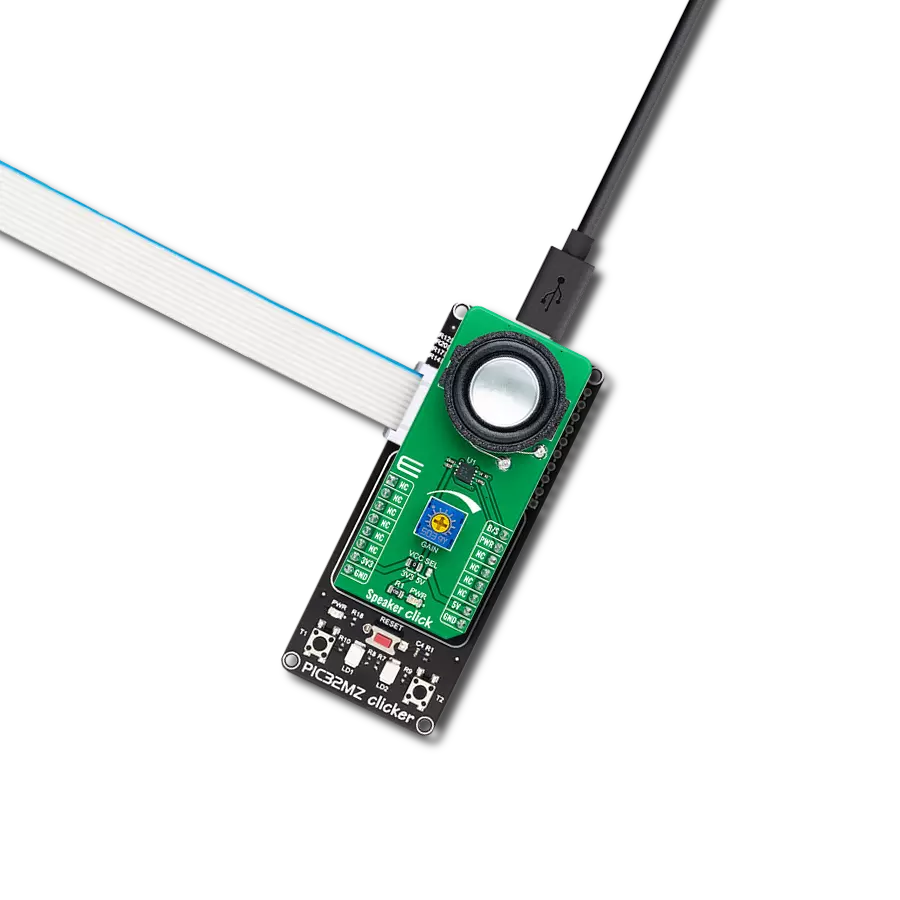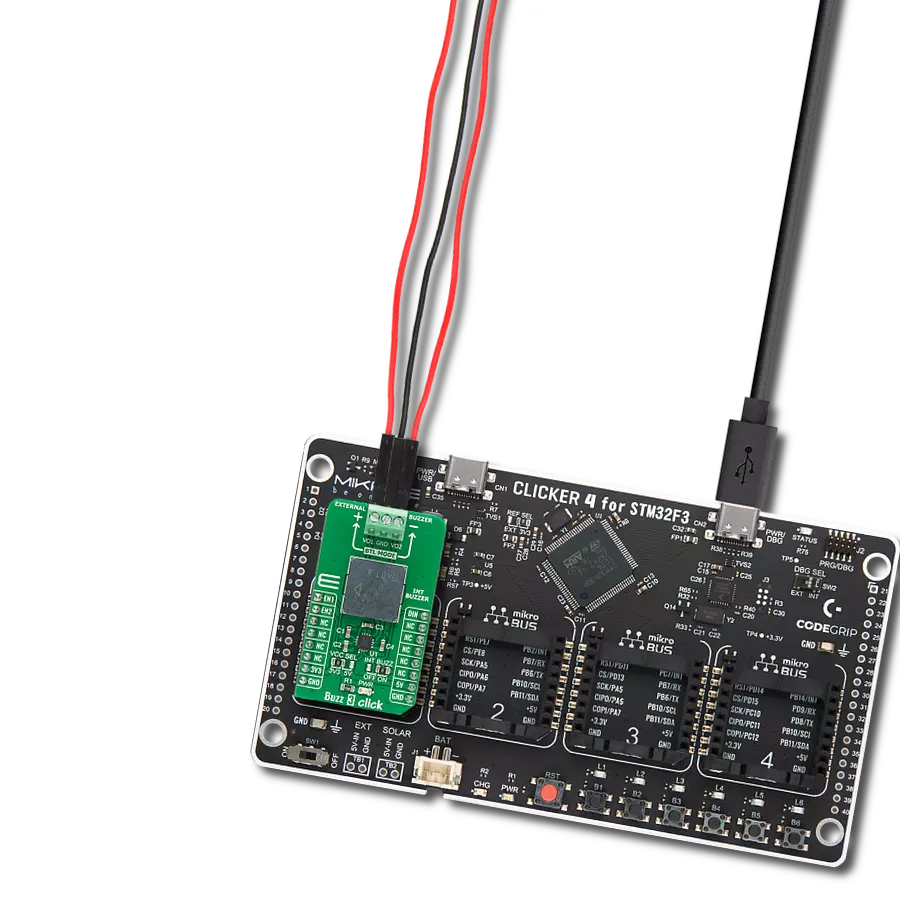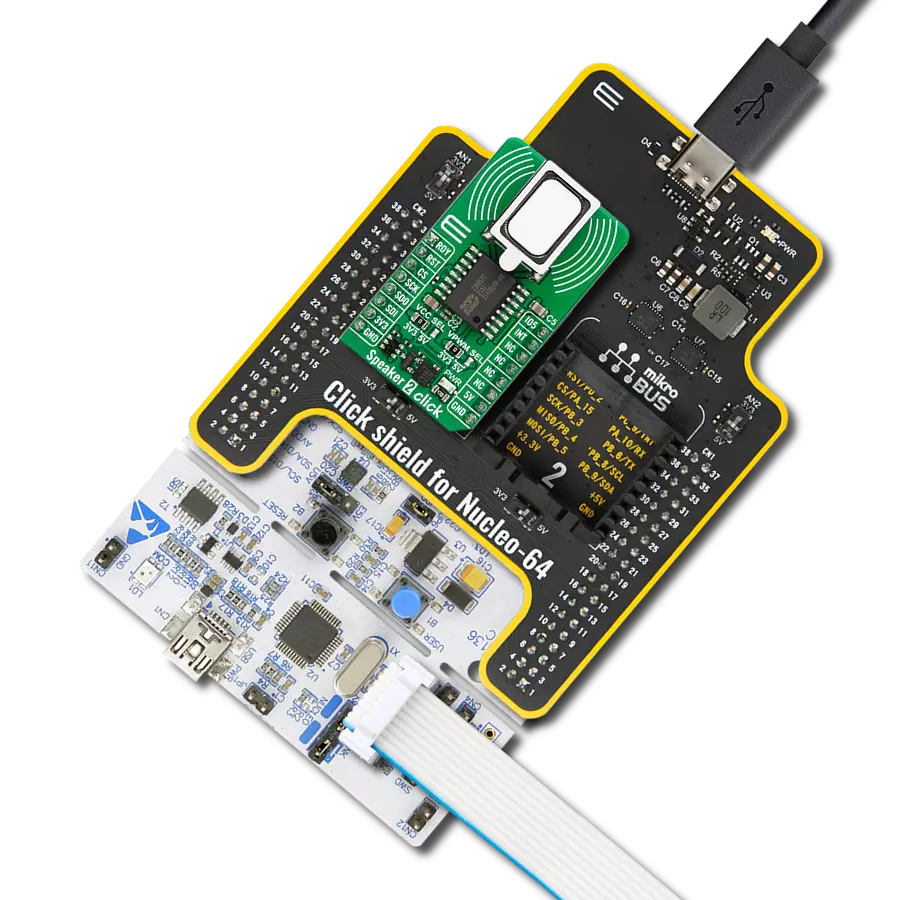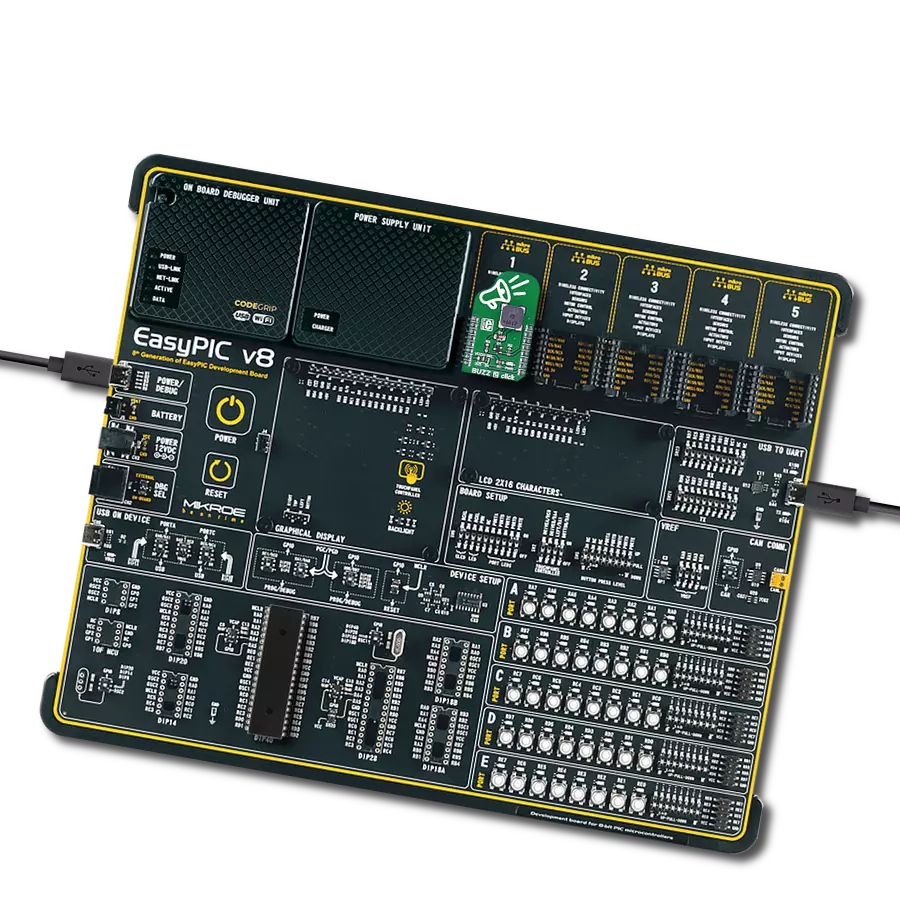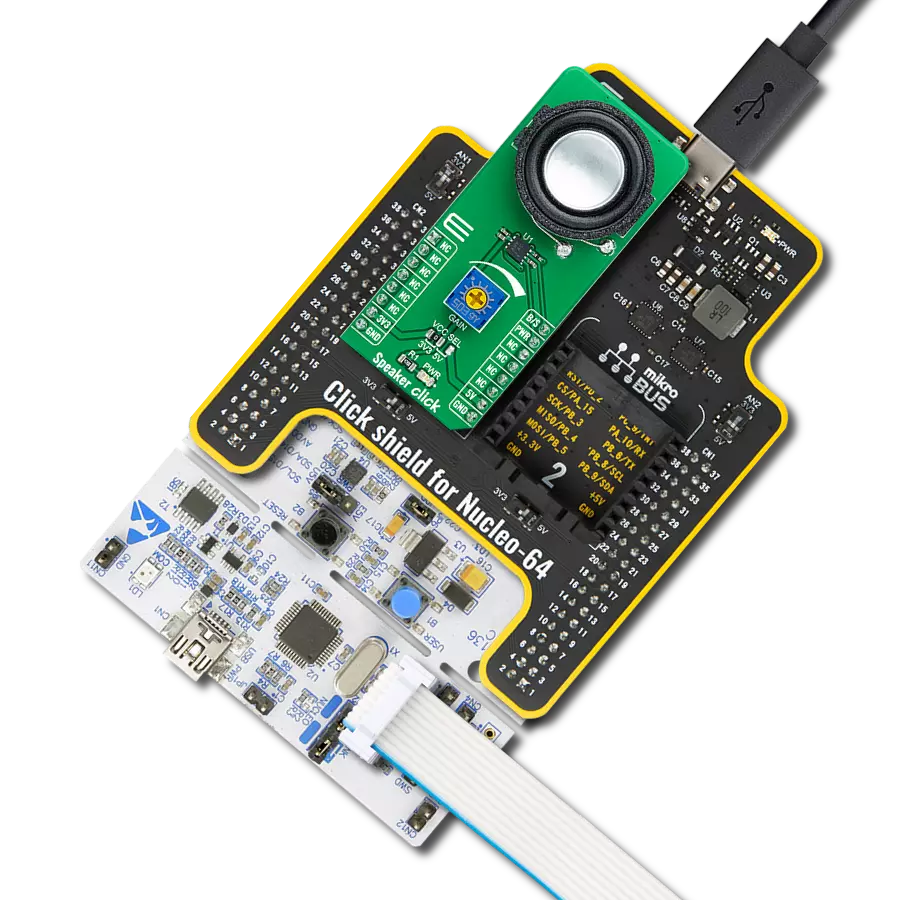Convert electrical energy into mechanical vibrations and produce audible sound waves
A
A
Hardware Overview
How does it work?
Piezo Driver Click is based on the PAM8906, a piezo sounder driver with self-excitation mode from Diodes Incorporated. It features automatic shutdown and wake-up control, low operating current, very short turn ON/OFF, over-voltage protection, over-current protection, and more. This driver operates with an external PWM input. It can drive a two-terminal or three-terminal piezo sounder, and selection can be made over the
TERMINAL SEL jumper. The piezo sounder can be connected over the 3-pin screw terminal, labeled differently for both available options. In addition, you can use VOUT to power up the piezo sounder. Piezo Driver Click uses a PWM input pin to communicate with the host MCU. The PWM input will be amplified and driven to the output terminal if used as an external PWM control. It can also be used for automatic wake-up and shutdown
control. This Click board™ can operate with either 3.3V or 5V logic voltage levels selected via the VCC SEL jumper. This way, both 3.3V and 5V capable MCUs can use the communication lines properly. Also, this Click board™ comes equipped with a library containing easy-to-use functions and an example code that can be used as a reference for further development.
Features overview
Development board
Fusion for TIVA v8 is a development board specially designed for the needs of rapid development of embedded applications. It supports a wide range of microcontrollers, such as different 32-bit ARM® Cortex®-M based MCUs from Texas Instruments, regardless of their number of pins, and a broad set of unique functions, such as the first-ever embedded debugger/programmer over a WiFi network. The development board is well organized and designed so that the end-user has all the necessary elements, such as switches, buttons, indicators, connectors, and others, in one place. Thanks to innovative manufacturing technology, Fusion for TIVA v8 provides a fluid and immersive working experience, allowing access
anywhere and under any circumstances at any time. Each part of the Fusion for TIVA v8 development board contains the components necessary for the most efficient operation of the same board. An advanced integrated CODEGRIP programmer/debugger module offers many valuable programming/debugging options, including support for JTAG, SWD, and SWO Trace (Single Wire Output)), and seamless integration with the Mikroe software environment. Besides, it also includes a clean and regulated power supply module for the development board. It can use a wide range of external power sources, including a battery, an external 12V power supply, and a power source via the USB Type-C (USB-C) connector.
Communication options such as USB-UART, USB HOST/DEVICE, CAN (on the MCU card, if supported), and Ethernet is also included. In addition, it also has the well-established mikroBUS™ standard, a standardized socket for the MCU card (SiBRAIN standard), and two display options for the TFT board line of products and character-based LCD. Fusion for TIVA v8 is an integral part of the Mikroe ecosystem for rapid development. Natively supported by Mikroe software tools, it covers many aspects of prototyping and development thanks to a considerable number of different Click boards™ (over a thousand boards), the number of which is growing every day.
Microcontroller Overview
MCU Card / MCU
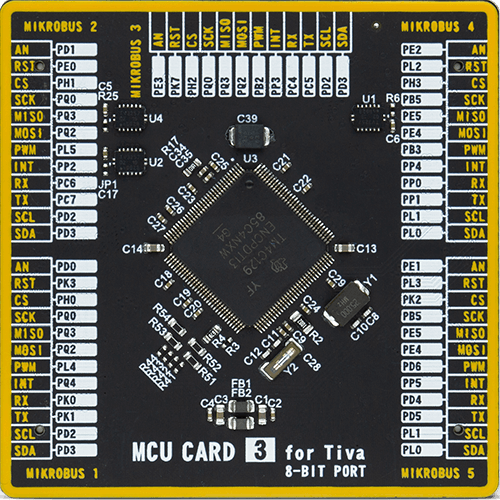
Type
8th Generation
Architecture
ARM Cortex-M4
MCU Memory (KB)
1024
Silicon Vendor
Texas Instruments
Pin count
128
RAM (Bytes)
262144
Used MCU Pins
mikroBUS™ mapper
Take a closer look
Click board™ Schematic
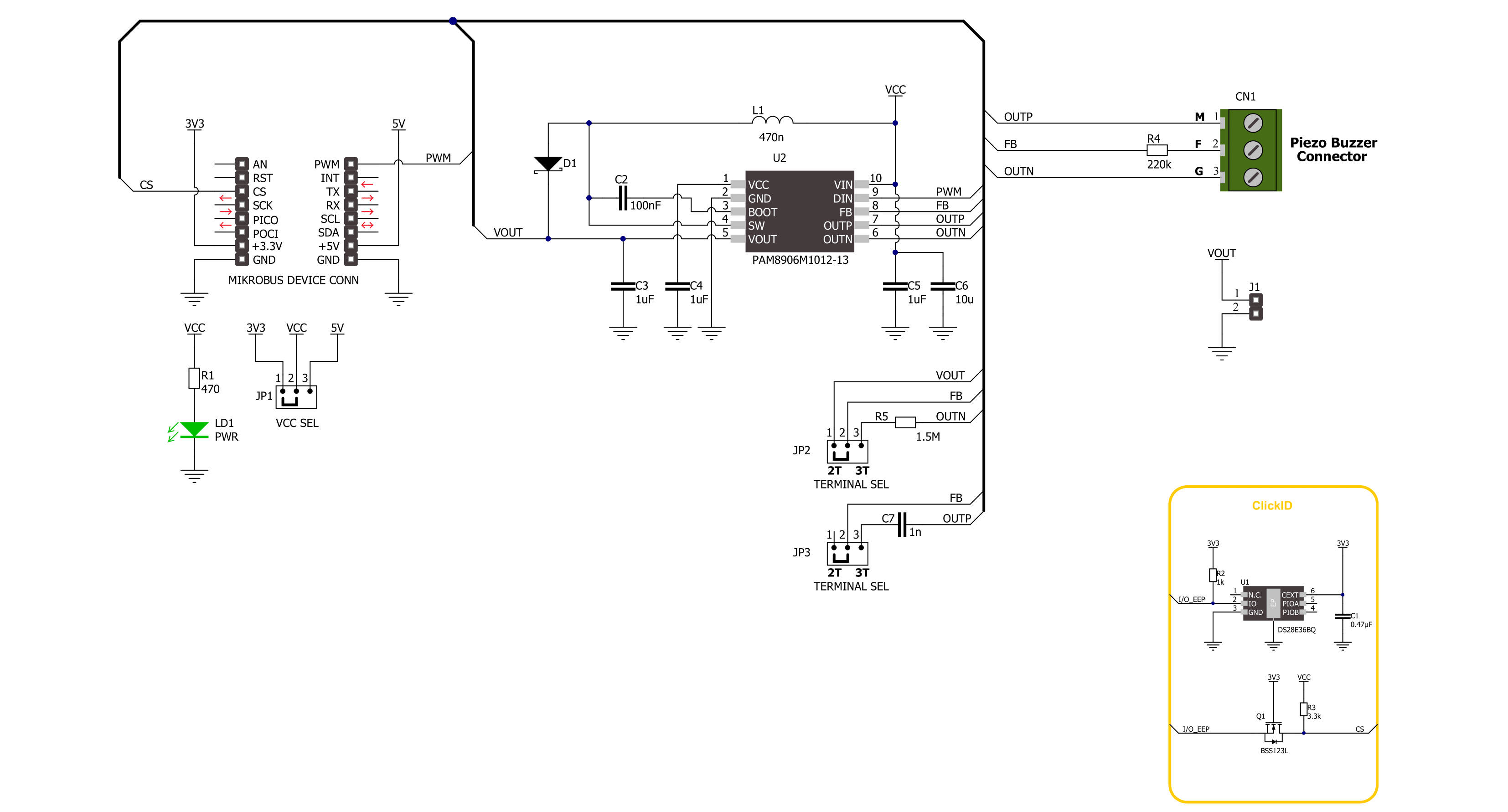
Step by step
Project assembly
Software Support
Library Description
This library contains API for Piezo Driver Click driver.
Key functions:
piezodriver_pwm_stop- Piezo Driver stop PWM module.piezodriver_pwm_start- Piezo Driver start PWM module.piezodriver_play_sound- Piezo Driver play sound function.
Open Source
Code example
The complete application code and a ready-to-use project are available through the NECTO Studio Package Manager for direct installation in the NECTO Studio. The application code can also be found on the MIKROE GitHub account.
/*!
* @file main.c
* @brief Piezo Driver Click example
*
* # Description
* This example demonstrates the use of Piezo Driver Click board.
*
* The demo application is composed of two sections :
*
* ## Application Init
* Initializes the driver and logger.
*
* ## Application Task
* Plays the Imperial March melody. Also logs an appropriate message on the USB UART.
*
* @note
* The minimal PWM Clock frequency required for this example is the frequency of tone C6 - 1047 Hz.
* In order to run this example and play all tones correctly, the user will need to decrease
* the MCU's main clock frequency in MCU Settings for certain architectures
* in order to get the required PWM clock frequency.
*
* @author Stefan Ilic
*
*/
#include "board.h"
#include "log.h"
#include "piezodriver.h"
static piezodriver_t piezodriver;
static log_t logger;
#define W 4*Q // Whole 4/4 - 4 Beats
#define H 2*Q // Half 2/4 - 2 Beats
#define Q 250 // Quarter 1/4 - 1 Beat
#define E Q/2 // Eighth 1/8 - 1/2 Beat
#define S Q/4 // Sixteenth 1/16 - 1/4 Beat
#define VOLUME 100
/**
* @brief Piezo Driver play Imperial march function.
* @details This function is used to play Imperial march on the buzzer.
* @return Nothing.
* @note None.
*/
static void imperial_march( );
void application_init ( void )
{
log_cfg_t log_cfg; /**< Logger config object. */
piezodriver_cfg_t piezodriver_cfg; /**< Click config object. */
/**
* Logger initialization.
* Default baud rate: 115200
* Default log level: LOG_LEVEL_DEBUG
* @note If USB_UART_RX and USB_UART_TX
* are defined as HAL_PIN_NC, you will
* need to define them manually for log to work.
* See @b LOG_MAP_USB_UART macro definition for detailed explanation.
*/
LOG_MAP_USB_UART( log_cfg );
log_init( &logger, &log_cfg );
log_info( &logger, " Application Init " );
// Click initialization.
piezodriver_cfg_setup( &piezodriver_cfg );
PIEZODRIVER_MAP_MIKROBUS( piezodriver_cfg, MIKROBUS_1 );
if ( PWM_ERROR == piezodriver_init( &piezodriver, &piezodriver_cfg ) )
{
log_error( &logger, " Communication init." );
for ( ; ; );
}
if ( PIEZODRIVER_ERROR == piezodriver_default_cfg ( &piezodriver ) )
{
log_error( &logger, " Default configuration." );
for ( ; ; );
}
log_info( &logger, " Application Task " );
}
void application_task ( void )
{
log_printf( &logger, "Playing the Imperial March melody ...\r\n" );
imperial_march( );
// 10 seconds delay
Delay_ms ( 1000 );
Delay_ms ( 1000 );
Delay_ms ( 1000 );
Delay_ms ( 1000 );
Delay_ms ( 1000 );
Delay_ms ( 1000 );
Delay_ms ( 1000 );
Delay_ms ( 1000 );
Delay_ms ( 1000 );
Delay_ms ( 1000 );
}
int main ( void )
{
/* Do not remove this line or clock might not be set correctly. */
#ifdef PREINIT_SUPPORTED
preinit();
#endif
application_init( );
for ( ; ; )
{
application_task( );
}
return 0;
}
static void imperial_march( )
{
piezodriver_play_sound(&piezodriver, PIEZODRIVER_NOTE_A6, VOLUME, Q );
Delay_ms ( 1 + Q );
piezodriver_play_sound(&piezodriver, PIEZODRIVER_NOTE_A6, VOLUME, Q );
Delay_ms ( 1 + Q );
piezodriver_play_sound(&piezodriver, PIEZODRIVER_NOTE_A6, VOLUME, Q );
Delay_ms ( 1 + Q );
piezodriver_play_sound(&piezodriver, PIEZODRIVER_NOTE_F6, VOLUME, E + S );
Delay_ms ( 1 + E + S );
piezodriver_play_sound(&piezodriver, PIEZODRIVER_NOTE_C7, VOLUME, S );
Delay_ms ( 1 + S );
piezodriver_play_sound(&piezodriver, PIEZODRIVER_NOTE_A6, VOLUME, Q );
Delay_ms ( 1 + Q );
piezodriver_play_sound(&piezodriver, PIEZODRIVER_NOTE_F6, VOLUME, E + S );
Delay_ms ( 1 + E + S );
piezodriver_play_sound(&piezodriver, PIEZODRIVER_NOTE_C7, VOLUME, S );
Delay_ms ( 1 + S );
piezodriver_play_sound(&piezodriver, PIEZODRIVER_NOTE_A6, VOLUME, H );
Delay_ms ( 1 + H );
piezodriver_play_sound(&piezodriver, PIEZODRIVER_NOTE_E7, VOLUME, Q );
Delay_ms ( 1 + Q );
piezodriver_play_sound(&piezodriver, PIEZODRIVER_NOTE_E7, VOLUME, Q );
Delay_ms ( 1 + Q );
piezodriver_play_sound(&piezodriver, PIEZODRIVER_NOTE_E7, VOLUME, Q );
Delay_ms ( 1 + Q );
piezodriver_play_sound(&piezodriver, PIEZODRIVER_NOTE_F7, VOLUME, E + S );
Delay_ms ( 1 + E + S );
piezodriver_play_sound(&piezodriver, PIEZODRIVER_NOTE_C7, VOLUME, S );
Delay_ms ( 1 + S );
piezodriver_play_sound(&piezodriver, PIEZODRIVER_NOTE_AB6, VOLUME, Q );
Delay_ms ( 1 + Q );
piezodriver_play_sound(&piezodriver, PIEZODRIVER_NOTE_F6, VOLUME, E + S );
Delay_ms ( 1 + E + S );
piezodriver_play_sound(&piezodriver, PIEZODRIVER_NOTE_C7, VOLUME, S );
Delay_ms ( 1 + S );
piezodriver_play_sound(&piezodriver, PIEZODRIVER_NOTE_A6, VOLUME, H );
Delay_ms ( 1 + H );
piezodriver_play_sound(&piezodriver, PIEZODRIVER_NOTE_A7, VOLUME, Q );
Delay_ms ( 1 + Q );
piezodriver_play_sound(&piezodriver, PIEZODRIVER_NOTE_A6, VOLUME, E + S );
Delay_ms ( 1 + E + S );
piezodriver_play_sound(&piezodriver, PIEZODRIVER_NOTE_A6, VOLUME, S );
Delay_ms ( 1 + S );
piezodriver_play_sound(&piezodriver, PIEZODRIVER_NOTE_A7, VOLUME, Q );
Delay_ms ( 1 + Q );
piezodriver_play_sound(&piezodriver, PIEZODRIVER_NOTE_AB7, VOLUME, E + S );
Delay_ms ( 1 + E + S );
piezodriver_play_sound(&piezodriver, PIEZODRIVER_NOTE_G7, VOLUME, S );
Delay_ms ( 1 + S );
piezodriver_play_sound(&piezodriver, PIEZODRIVER_NOTE_GB7, VOLUME, S );
Delay_ms ( 1 + S );
piezodriver_play_sound(&piezodriver, PIEZODRIVER_NOTE_E7, VOLUME, Q );
Delay_ms ( 1 + Q );
piezodriver_play_sound(&piezodriver, PIEZODRIVER_NOTE_F7, VOLUME, E );
Delay_ms ( 1 + E );
Delay_ms ( 1 + E );
piezodriver_play_sound(&piezodriver, PIEZODRIVER_NOTE_BB6, VOLUME, E );
Delay_ms ( 1 + E );
piezodriver_play_sound(&piezodriver, PIEZODRIVER_NOTE_EB7, VOLUME, Q );
Delay_ms ( 1 + Q );
piezodriver_play_sound(&piezodriver, PIEZODRIVER_NOTE_D7, VOLUME, E + S );
Delay_ms ( 1 + E + S );
piezodriver_play_sound(&piezodriver, PIEZODRIVER_NOTE_DB7, VOLUME, S );
Delay_ms ( 1 + S );
piezodriver_play_sound(&piezodriver, PIEZODRIVER_NOTE_C7, VOLUME, S );
Delay_ms ( 1 + S );
piezodriver_play_sound(&piezodriver, PIEZODRIVER_NOTE_B6, VOLUME, S );
Delay_ms ( 1 + S );
piezodriver_play_sound(&piezodriver, PIEZODRIVER_NOTE_C7, VOLUME, E );
Delay_ms ( 1 + E );
Delay_ms ( 1 + E );
piezodriver_play_sound(&piezodriver, PIEZODRIVER_NOTE_F6, VOLUME, E );
Delay_ms ( 1 + E );
piezodriver_play_sound(&piezodriver, PIEZODRIVER_NOTE_AB6, VOLUME, Q );
Delay_ms ( 1 + Q );
piezodriver_play_sound(&piezodriver, PIEZODRIVER_NOTE_F6, VOLUME, E + S );
Delay_ms ( 1 + E + S );
piezodriver_play_sound(&piezodriver, PIEZODRIVER_NOTE_A6, VOLUME, S );
Delay_ms ( 1 + S );
piezodriver_play_sound(&piezodriver, PIEZODRIVER_NOTE_C7, VOLUME, Q );
Delay_ms ( 1 + Q );
piezodriver_play_sound(&piezodriver, PIEZODRIVER_NOTE_A6, VOLUME, E + S );
Delay_ms ( 1 + E + S );
piezodriver_play_sound(&piezodriver, PIEZODRIVER_NOTE_C7, VOLUME, S );
Delay_ms ( 1 + S );
piezodriver_play_sound(&piezodriver, PIEZODRIVER_NOTE_E7, VOLUME, H );
Delay_ms ( 1 + H );
piezodriver_play_sound(&piezodriver, PIEZODRIVER_NOTE_A7, VOLUME, Q );
Delay_ms ( 1 + Q );
piezodriver_play_sound(&piezodriver, PIEZODRIVER_NOTE_A6, VOLUME, E + S );
Delay_ms ( 1 + E + S );
piezodriver_play_sound(&piezodriver, PIEZODRIVER_NOTE_A6, VOLUME, S );
Delay_ms ( 1 + S );
piezodriver_play_sound(&piezodriver, PIEZODRIVER_NOTE_A7, VOLUME, Q );
Delay_ms ( 1 + Q );
piezodriver_play_sound(&piezodriver, PIEZODRIVER_NOTE_AB7, VOLUME, E + S );
Delay_ms ( 1 + E + S );
piezodriver_play_sound(&piezodriver, PIEZODRIVER_NOTE_G7, VOLUME, S );
Delay_ms ( 1 + S );
piezodriver_play_sound(&piezodriver, PIEZODRIVER_NOTE_GB7, VOLUME, S );
Delay_ms ( 1 + S );
piezodriver_play_sound(&piezodriver, PIEZODRIVER_NOTE_E7, VOLUME, S );
Delay_ms ( 1 + S );
piezodriver_play_sound(&piezodriver, PIEZODRIVER_NOTE_F7, VOLUME, E );
Delay_ms ( 1 + E );
Delay_ms ( 1 + E );
piezodriver_play_sound(&piezodriver, PIEZODRIVER_NOTE_BB6, VOLUME, E );
Delay_ms ( 1 + E );
piezodriver_play_sound(&piezodriver, PIEZODRIVER_NOTE_EB7, VOLUME, Q );
Delay_ms ( 1 + Q );
piezodriver_play_sound(&piezodriver, PIEZODRIVER_NOTE_D7, VOLUME, E + S );
Delay_ms ( 1 + E + S );
piezodriver_play_sound(&piezodriver, PIEZODRIVER_NOTE_DB7, VOLUME, S );
Delay_ms ( 1 + S );
piezodriver_play_sound(&piezodriver, PIEZODRIVER_NOTE_C7, VOLUME, S );
Delay_ms ( 1 + S );
piezodriver_play_sound(&piezodriver, PIEZODRIVER_NOTE_B6, VOLUME, S );
Delay_ms ( 1 + S );
piezodriver_play_sound(&piezodriver, PIEZODRIVER_NOTE_C7, VOLUME, E );
Delay_ms ( 1 + E );
Delay_ms ( 1 + E );
piezodriver_play_sound(&piezodriver, PIEZODRIVER_NOTE_F6, VOLUME, E );
Delay_ms ( 1 + E );
piezodriver_play_sound(&piezodriver, PIEZODRIVER_NOTE_AB6, VOLUME, Q );
Delay_ms ( 1 + Q );
piezodriver_play_sound(&piezodriver, PIEZODRIVER_NOTE_F6, VOLUME, E + S );
Delay_ms ( 1 + E + S );
piezodriver_play_sound(&piezodriver, PIEZODRIVER_NOTE_C7, VOLUME, S );
Delay_ms ( 1 + S );
piezodriver_play_sound(&piezodriver, PIEZODRIVER_NOTE_A6, VOLUME, Q );
Delay_ms ( 1 + Q );
piezodriver_play_sound(&piezodriver, PIEZODRIVER_NOTE_F6, VOLUME, E + S );
Delay_ms ( 1 + E + S );
piezodriver_play_sound(&piezodriver, PIEZODRIVER_NOTE_C7, VOLUME, S );
Delay_ms ( 1 + S );
piezodriver_play_sound(&piezodriver, PIEZODRIVER_NOTE_AB6, VOLUME, H );
Delay_ms ( 1 + H );
}
// ------------------------------------------------------------------------ END


















